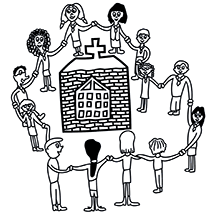


Welcome to St Michael's Nursery, a happy and friendly nursery with a genuine family feel; the perfect environment for children to learn together and develop long lasting friendships particularly for those who go on to join our special school. The children at St Michael's nursery benefit from our close-knit, supportive and nurturing environment where no child is left out and no child is left behind. We live by our motto, we are 'small enough for everyone to count but big enough to make a difference!'
We look forward to welcoming you and your child to be part of our happy family!
Please call the school for more information or email: nursery@stmichaels.lewisham.sch.uk
To be eligible to register with our nursery your child needs to be thee years old at the time of joining. The registration process involves completing a simple application form (see below) and providing two pieces of paperwork: proof of address and your child's birth certificate.
The following should be noted when completing the application form:
Prior to your child's start date, you will also be required to complete a Nursery Pupil Information Booklet detailing emergency contact information, collection arrangements, medical information and dietary requirements.
Click here to Download a copy of the Nursery Application Form
Payment for unfunded hours must be paid in advance for the following half-term via ParentPay. ParentPay is our chosen method of payment as it is efficient and is fully secure. Once your child is registered with the nursery you will be given access to ParentPay to make the necessary payments. Payment may also be made using Childcare Vouchers. Should you wish to use this method of payment, please contact the School Business Manager in the school office.
If fees are not paid in advance of attendance, your child's place will be withdrawn.
A hot lunch provided by the school costs £2.75 per day and must be paid via ParentPay in advance.
Children may wear their own clothes when attending nursery. Jewellery must not be worn to nursery since it is easily lost and can cause injury.
Although aprons are provided for messy activities in the nursery, please send your child in sensible, washable, practical clothing enabling them to cope when going to the toilet. If your child is worried about getting dirty he/she will not get the most out of their time at nursery. We do not recommend dungarees, belts with buckles or trousers with difficult fasteners as these might prove difficult for your child and cause him/her to have toilet accidents.
As nursery education involves both indoor and outdoor activities please ensure that your child wears clothing appropriate to the weather. This should include coats and hats for cold weather, sun hats, sun cream and cool clothing for warm weather.
Please mark all clothing and footwear clearly with your child’s name to help us identify any lost items.